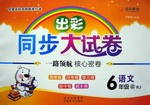题目内容
Time is , but we are not making any progress.
A, getting around B. dying away C. ripping off D. running out
练习册系列答案
 出彩同步大试卷系列答案
出彩同步大试卷系列答案
相关题目
题目内容
Time is , but we are not making any progress.
A, getting around B. dying away C. ripping off D. running out
 出彩同步大试卷系列答案
出彩同步大试卷系列答案